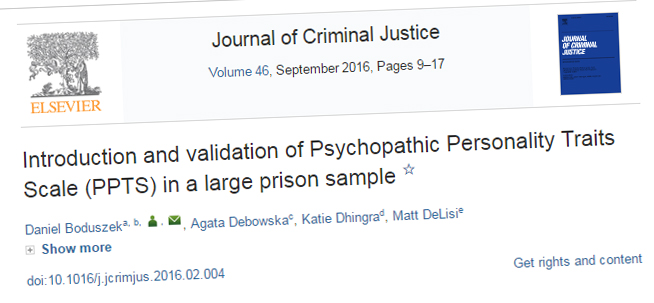Psychopathy of 1,800 prisoners leads to novel diagnostic tool

Wed, 20 Jul 2016 17:07:00 BST
“…psychopathic traits uncontaminated with behavioural items can be used in the same way among participants with and without criminal history…”
 AFTER a large-scale research project involving hundreds of prisoners at maximum security jails, a psychologist at the University of Huddersfield has developed a new method for assessing psychopathy.
AFTER a large-scale research project involving hundreds of prisoners at maximum security jails, a psychologist at the University of Huddersfield has developed a new method for assessing psychopathy.
Dr Daniel Boduszek’s aim was to devise a scale that would grasp the essence of psychopathy, without being influenced by the subject’s background characteristics, including criminal history. Psychopaths – marked out by traits such as manipulativeness and egocentricity – exist and can flourish in many areas of life, such as business.
Therefore there is a need for what Dr Boduszek describes in a new article as a “clean personality measure of psychopathy uncontaminated with behavioural items”. This would “enable researchers to extend the construct to all populations regardless of criminal history”.
So, although Dr Boduszek and his co-researchers conducted their study among 1,794 prisoners at ten prisons, the criminality and anti-social behaviour of the volunteer participants was not a factor when they were asked to give their levels of agreement to the 20 statements that are part of the Psychopathic Personality Traits Scale (PPTS). This has been devised by Dr Boduszek, who is Reader in Criminal Psychology at the University of Huddersfield.
 The full list of statements in the PPTS – a “self-report scale” – is given in the new article by Dr Boduszek (pictured right) and his co-researchers that is newly-published in the Journal of Criminal Justice.
The full list of statements in the PPTS – a “self-report scale” – is given in the new article by Dr Boduszek (pictured right) and his co-researchers that is newly-published in the Journal of Criminal Justice.
They include: “I don’t care if I upset someone to get what I want”; “I tend to focus on my own thoughts and ideas rather than on what others might be thinking”; “Seeing people cry doesn’t really upset me”; “In general, I’m only willing to help other people if doing so will benefit me as well”; “I sometimes provoke people on purpose to see their reaction”.
The purpose of the newly-developed PPTS is to place the emphasis on the core factors that were first described in the 1940s by the influential US psychologist Hervey M. Cleckley, author ofThe Mask of Sanity: An attempt to clarify some issues about the so-called psychopathic personality.
One of the priorities when developing the new scale was to ensure that egocentricity is fully tested. This was one of Cleckley’s key criteria but it “has been largely neglected in psychopathy assessment research to date”, according to DrBoduszek.
He is Polish-born, and before switching to an academic career he worked as a psychologist in prisons, including maximum-security correctional units. His contacts helped him to organise the large-scale trial of PPTS when 2,000 prisoners in ten maximum security prisons in Poland were invited to participate. Almost, 1,800 agreed to do so, and DrBoduszek ensured that there was a spread of offenders – they ranged from murderers and sexual predators to people who had committed non-violent crimes.
As a means of validating the PPTS and measuring its success, the participants also completed six other personality-assessment scales that are in use. In his article, Dr Boduszek gives a detailed description of the methodology and the outcome and argues that his psychopathy model is represented by four distinctive factors, including affective responsiveness, cognitive responsiveness, interpersonal manipulation, and egocentricity. He also emphasised that psychopathy should not be studied without controlling for the level of intelligence.
He concludes that “this brief measure of psychopathic traits uncontaminated with behavioural items can be used in the same way among participants with and without criminal history”.
There will be further development and testing of the PPTS, and DrBoduszek is hoping to carry out research in UK and US prisons and among the general population. The goal is to develop a diagnostic tool that could have its most practical application within prisons – for example, as a way of identifying inmates with increased psychopathic traits to suggest the most appropriate therapeutic interventions for such individuals.
- The article Introduction and validation of Psychopathic Personality Traits Scale in a large prison sample, by Daniel Boduszek, with Agata Debowska, Katie Dhingra and Matt DeLisi, appears in Journal of Criminal Justice.







